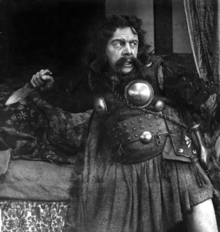The Real Thing at Last
The Real Thing at Last is a satirical silent movie based on the play Macbeth. It was written in 1916 by Peter Pan creator and playwright J. M. Barrie as a parody of the American entertainment industry. The film was made by the newly created British Actors Film Company in response to news that American filmmaker D. W. Griffith intended to honor the 300th anniversary of William Shakespeare's death with the production of a film version of the play. It was subtitled as A Suggestion for the Artists of the Future.[2] No copies of The Real Thing at Last are known to survive.[3][1]
| The Real Thing at Last | |
|---|---|
 | |
| Directed by | L. C. MacBean J. M. Barrie |
| Produced by | A. E. Matthews |
| Written by | J. M. Barrie William Shakespeare (original play) |
| Starring | Edmund Gwenn Nelson Keys Godfrey Tearle Owen Nares Norman Forbes |
| Distributed by | British Actors Film Company |
Release date |
|
Running time | 30 minutes |
| Country | United Kingdom |
| Language | Silent film (English intertitles) |
Plot
Fictional American film producer Rupert K. Thunder (played on stage by Edmund Gwenn) hosted the 30-minute film live, commenting on it as it played.[4][2]
It parodies the sensationalism of the American film industry of the day, including a controversial earlier adaptation of Macbeth,[1] contrasting it with more reserved and understated British sensibilities. It loosely follows the plot of the play, but two versions of each depicted scene are shown:
In the British version, Lady Macbeth wiped a small amount of blood from her hands; in the American she had to wash away gallons of the stuff. In the British, the witches danced around a small cauldron; in the American the witches became dancing beauties cavorting around a huge cauldron. In the British, Macbeth and Macduff fought in a ditch; in the American Macbeth falls to his death from a skyscraper.[3]
The endings also differed:
The British version ended with typical coy understatement: 'The elegant home of the Macbeths is no longer a happy one', while the American version blithely opted for closure of a different kind: 'The Macbeths repent and all ends happily.'[1]
The piano accompaniment for the closing scene of Macbeth and Macduff reconciling is "Life's Too Short to Quarrel".[5]
Cast
- Edmund Gwenn - Rupert K. Thunder (live host), Macbeth
- Nelson Keys - Lady Macbeth
- Godfrey Tearle - Macduff
- Owen Nares - General Banquo
- Norman Forbes - Duncan
- Caleb Porter - Witch
- George Kelly - Witch
- Ernest Thesiger - Witch
- Gladys Cooper - American Witch
- Teddie Gerard - American Witch
- Pauline Chase - American Witch
- Frederick Volpe - Murderer
- Moya Mannering - Messenger
- A.E. Matthews - Murdered
- Marie Lohr - Murdered
- Frederick Kerr - Murdered
- Irene Vanbrugh - Lady
- Eva Rowland - Lady
- Arthur Shirley - Courtier
- Leslie Henson - Charlie Chaplin, William Shakespeare, Page
- Florence Alliston - Child
Production
Although nominally directed by L. C. MacBean, Barrie took an active role in its direction.[3] The film featured several popular British stage actors of the period, and thus served as the film debuts of Edmund Gwenn, Marie Lohr, Ernest Thesiger, and Frederick Kerr. Pauline Chase had been part of the original cast of Barrie's Peter Pan and played the title role for seven years; she came out of retirement for this, her only screen performance.
Release
The film was presented at the London Coliseum as part of a benefit for the YMCA raising money to entertain the troops serving in the Great War. This was attended by Queen Mary, Princess Mary, and Prince Albert (later King George VI).[4]
References
- Buchanan, Judith R. (22 July 2014). Shakespeare on Film. Routledge. ISBN 978-1-317-87497-3.
- Wheeler, Edward Jewitt; Funk, Isaac Kaufman; Woods, William Seaver (1916). The Literary Digest.
- urbanora. "Pen and pictures no. 3 – J.M. Barrie". The Bioscope. Retrieved 11 January 2016.
- TIMES, Special Cable to THE NEW YORK (9 March 1916). "BARRIE BURLESQUES MOVIES; " The Real Thing at Last" Puts a Comic "Macbeth" on the Screen". The New York Times. ISSN 0362-4331. Retrieved 24 May 2020.
- "Real Thing at Last, The · British Universities Film & Video Council". bufvc.ac.uk. Retrieved 24 May 2020.